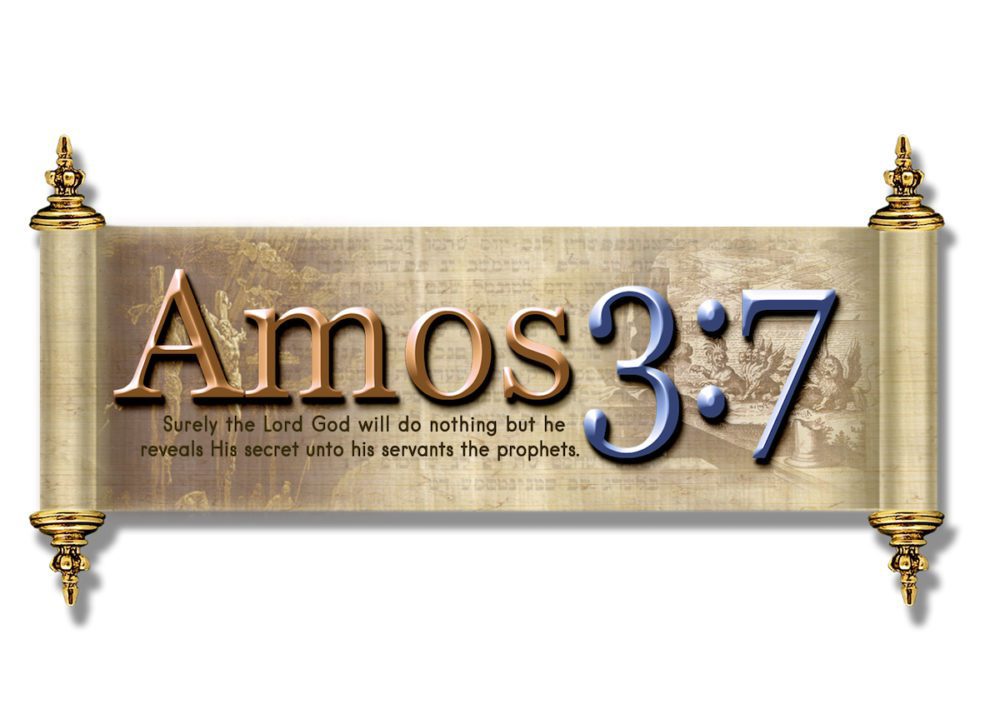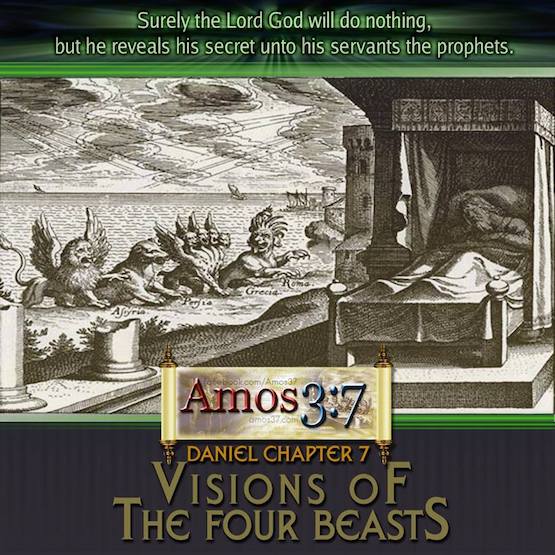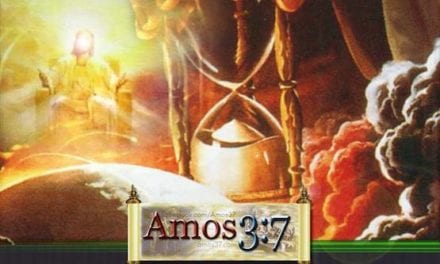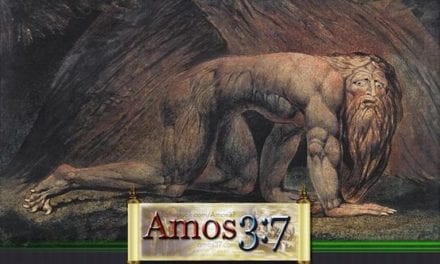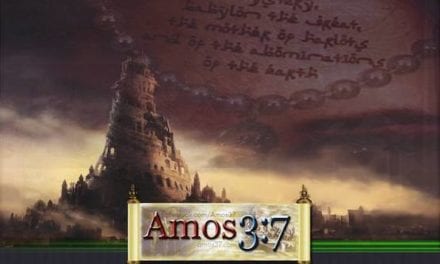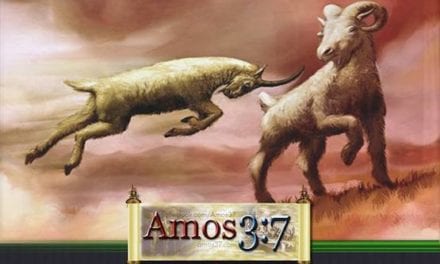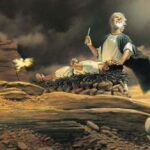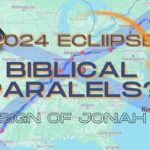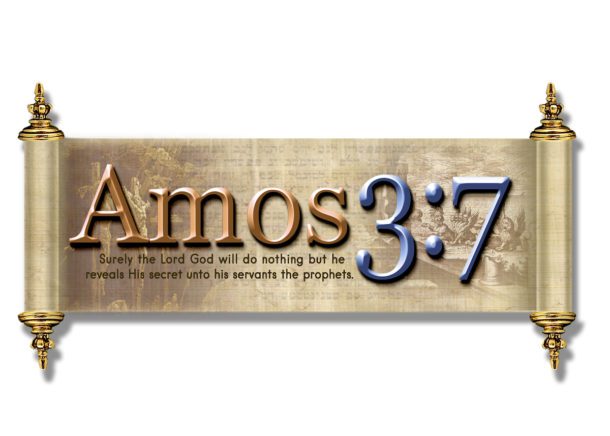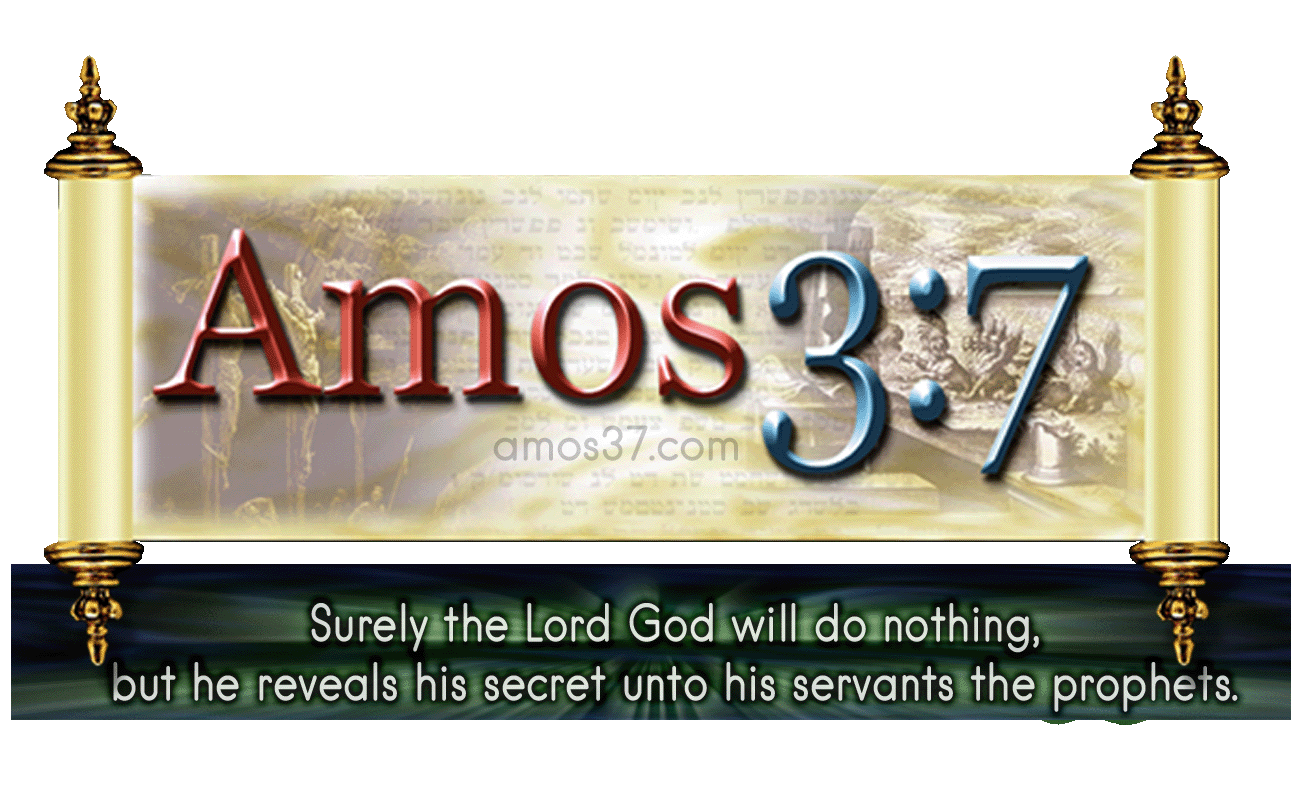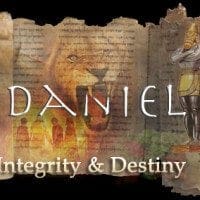 THE BOOK OF DANIEL is quoted often in the New Testament Book of Revelation. Daniel ch. The Vision of The Four Beasts. A verse by verse study. In many ways, the two books need to be read and studied together. Daniel lived at an important time of ancient history and his story is critical to our understanding of what is happening today. His visions speak powerfully of the end times, and his writing continues to exalt the “Most High God.” The accuracy and reliability of his remarks concerning future events have caused many to question his authorship of this book. However we have complete confidence that he not only wrote the book, but that God used him powerfully to bring His message to His people about what is about to happen in our time.
THE BOOK OF DANIEL is quoted often in the New Testament Book of Revelation. Daniel ch. The Vision of The Four Beasts. A verse by verse study. In many ways, the two books need to be read and studied together. Daniel lived at an important time of ancient history and his story is critical to our understanding of what is happening today. His visions speak powerfully of the end times, and his writing continues to exalt the “Most High God.” The accuracy and reliability of his remarks concerning future events have caused many to question his authorship of this book. However we have complete confidence that he not only wrote the book, but that God used him powerfully to bring His message to His people about what is about to happen in our time.
Daniel Chapter 7 Visions of The Four Beasts
Daniel 7 Hyper link for chapter
What is The “Times of the Gentiles”
The most comprehensive and detailed prophecy of future events to be found anywhere in the Old Testament (Cf. Dan 2, Rev 13, 17).
Chapter 7 begins the Second Division of the Book: Daniel’s Visions.
Chapter:
7 1st yr of Balshazzar (after Chapter 4, before 5)
8 3rd yr of Balshazzar (before 5)
9 1st yr of Darius
10-12 [3rd yr of Cyrus?]
Jerusalem shall be trodden down of the Gentiles, until the Times of the Gentiles be fulfilled. Luke 21:24
1] In the first year of Belshazzar king of Babylon Daniel had a dream and visions of his head upon his bed: then he wrote the dream, and told the sum of the matters.
2] Daniel spake and said, I saw in my vision by night, and, behold, the four winds of the heaven strove upon the great sea.
3] And four great beasts came up from the sea, diverse one from another. Nabonidus made Belshazzar his co-regent in his 3rd year: 553 B.C. Daniel was about 67 years old. Nebuchadnezzar had died nine years earlier
(Daniel 5 occurs 14 years later). “…sum”: essential summary (this the first vision given directly to
Daniel). Because of the great significance of Daniel’s dream, he immediately wrote down a summary of it.
“I saw…”: 9X this chapter— “was beholding.” In the 1st six chapters, Daniel wrote in the 3rd person; in the last six chapters he wrote in the 1st person. The great sea churned by the action of four winds: The word translated
“winds,” ruach, may also be rendered “spirits,” Elsewhere in Scripture this word is used to refer to God’s providential actions in the affairs of men through angels (Jer 23:19; 49:36; 51:1; Zech 6:1-6; 7:14; Rev 7:1-3).
Throughout the OT the Mediterranean Sea is referred to as the Great Sea (Num 34:6-7; Josh 1:4; 9:1; 15:12, 47; 23:4; Ezek 47:10, 15, 20; 48:28). This vision related specifically to the Mediterranean world. Symbolic? Isa 8:7-
8; 17:12-13; 27:1; 57:20; Jer 6:23; 46:7-9; 47:2; Rev 13:1; 17:1, 15.
Beast No. 1
4] The first was like a lion, and had eagle’s wings: I beheld till the wings thereof were plucked, and it was lifted up from the earth, and made stand upon the feet as a man, and a man’s heart was given to it.
The four beasts represented four kingdoms (v. 17).
“…lion and had eagle’s wings”: Winged lion on gates of Babylon (British Museum); Jer 4:7; 48:40; 49:19-22; 50:17, 43-44; Lam :19; Ezek 17:3,12; Hab 1:8. [A new heart was given him?]
Beast No. 2
5] And behold another beast, a second, like to a bear, and it raised up itself on one side, and it had three ribs in the mouth of it between the teeth of it: and they said thus unto it, Arise, devour much flesh. “…bear”: less regal; ponderous; of formidable strength (Xerxes: 2.5 million men!). Unbalanced: Cf. Dan 8:3, two horns. One-sided union; Media already swallowed up by Persia by 550 B.C. “…three ribs”: Babylon, Egypt, Lydia defeated (Isa 13:17,18).
Beast No. 3
6] After this I beheld, and lo another, like a leopard, which had upon the back of it four wings of a fowl; the beast had also four heads; and dominion was given to it. The lion devours; the bear crushes; the leopard springs upon its prey. “…four heads”: Cassander: Greece & Macedonia; Lysimachus: Thrace & Bithynia (Asia Minor); Seleucus: Syria, Babylonia (>India); Ptolemy: Egypt, Palestine, Arabia Petrea (cf. Dan. 8:8, 22). Composite of three animals: Hos 13:5-8; Rev 13:2; 1 Sam 17:34-36; Prov 28:15; Jer 5:6; Amos 5:9.
Beast No. 4
7] After this I saw in the night visions, and behold a fourth beast, dreadful and terrible, and strong exceedingly; and it had great iron teeth: it devoured and brake in pieces, and stamped the residue with the feet of it: and it was diverse from all the beasts that were before it; and it had ten horns. No animal comparison: diverse from all the preceding; note the “iron” reference (Cf. Dan 2). Trampling all under foot: Cf. v.19. 10 horns = 10 kings (v.24).
Rome: Occupation of Sicily in 241 B.C., victory in the first Punic conflict. Mediterranean becomes a Roman lake by the beginning of second century B.C. Spain conquered first; then Carthage at the battle of Zama in N. Africa, 202 B.C.; subjugates are north of Italy; they then moved east, conquering Macedonia, Greece, and Asia Minor. Pompey swept into Jerusalem in 63 B.C. after destroying remnants of the Seleucid Empire (Syria).
Following decades: Empire controls southern Britain, France, Belgium, Switzerland, and Germany west of the Rhine River. Grew for four centuries, peaking in A.D. 117. Declined slowly, beginning in the third century; left Britain in A.D. 407; Rome sacked by the Visigoths in 410. It was not until 1453 that the last Roman or Byzantine ruler was killed in battle and Mohammed II conquered Constantinople (Cf. v. 24; Rev 17:12). Remains until replaced by Kingdom of Heaven: vv26, 27. 10 nations: Compare Dan 2:31-35; 40-45; 7:7-8; 19-24; Rev 13:1-2; 17:3,7,12-18.
Horn No. 11: The “Little Horn”
8] I considered the horns, and, behold, there came up among them another little horn, before whom there were three of the first horns plucked up by the roots: and, behold, in this horn were eyes like the eyes of man, and a mouth speaking great things.
“…Little Horn”: a 11th horn. First mention in Daniel. “…before whom”: behehewn, between whom. “Plucked up by the roots”: agar, uprooted gradually. “Eyes, mouth” = an individual. “Big Mouth”: v.11; Rev 11:36; 13:5,6. One of his many titles in the Old Testament. This “little horn” had an insignificant beginning but in its growth it was able to uproot three of the existing horns. (See vv. 19-26 for the identity of this fourth beast and its 11th horn.)
The “Ancient of Days”
9] I beheld till the thrones were cast down, and the Ancient of days did sit, whose garment was white as snow, and the hair of his head like the pure wool: his throne was like the fiery flame, and his wheels as burning fire. “Ancient of Days”: Mentioned three times in this chapter. Rema, located, placed (not “cast”). [Thrones, plural. Where are the 24 elders? (Church hidden in OT; Mt 13:34,35; Eph 3:5,9.)] “Fire”: Ex 3:2; 19:18; Consuming fire: Deut 4:24 (Heb 12:29); 9:3. Jesus: 2 Thess 1:8; Ps 18:8; 104:4; 50:3; Ezek 1:4; 13:21; Rev 4:5 (note 15:2). Sodom and Gomorrah, Gen 19:24; Nahab and Abihu, Lev 10:2; Isa 66:15-16. Fiery Stream: Ezek 1, 10:1.
10] A fiery stream issued and came forth from before him: thousand thousands ministered unto him, and ten thousand times ten thousand stood before him: the judgment was set, and the books were opened. In v.26, God the Judge takes His seat, the court convenes, and the books are opened. God, who assigns power to kingdoms, will judge those kingdoms. (Cf. Rev 20:12). “…books”: Ex 32:32; Isa 65:6 (evil deeds); Mal 3:16, (Book of Remembrance); Dan 12:1; Lk 10:20. [Note: Rev 20:10, 12-15 after millennium? Rev 10:20? Dan 7:10!]
“Mr. Big Mouth the Infamous Antichrist”
11] I beheld then because of the voice of the great words which the horn spake: I beheld even till the beast was slain, and his body destroyed, and given to the burning flame. As Daniel was watching the little horn because of its boasting (cf. v. 8) he saw that the fourth beast was slain and consigned to blazing fire. This event will terminate “the times of the Gentiles” (Lk 21:24, 27). Cf. Rev 19:19-21.
12] As concerning the rest of the beasts, they had their dominion taken away: yet their lives were prolonged for a season and time. The kingdoms represented by the three preceding beasts had already been stripped of their power by military conquest. But the fourth beast will be relieved of its power not by being conquered militarily, but by divine judgment (cf. Dan 9:27; Rev 11:15; 19:15). Each of the three, however, had been allowed to live for a short time. Joel 3:1-2; Mt 25:31-46; Rev 1:13; Mk 14:61. “prolonged for a season”: survive in another form in the kingdom that replaces them.
Rome on the Rise
• Cassander’s kingdom 146 B.C.
• Lysimachus’ kingdom 133 B.C.
• Seleucus’ kingdom 64 B.C.
• Ptolemy’s kingdom 31 B.C.
13] I saw in the night visions, and, behold, one like the Son of man came with the clouds of heaven, and came to the Ancient of days, and they brought him near before him.
14] And there was given him dominion, and glory, and a kingdom, that all people, nations, and languages, should serve him: his dominion is an everlasting dominion, which shall not pass away, and his kingdom that which shall not be destroyed.
The third major portion of this vision: the Son of Man approaching the Ancient of Days. Jesus Christ, taking the title “Son of Man” from this prophecy, frequently used it to refer to Himself (as recorded in the Gospels; cf. Mk 8:31; Jn 1:51). Son receives the Father’s gift (Ps 2:6-9); will rule over all nations (Ps 72:11; Rev 19:15-16; cf. 7:9-12; Rev 4,5; Isa 6:1-3; Ezek 1:4-28; 10:1-14). Cf. the Father’s promise to the Son in Ps 2:6-9; will be fulfilled at Christ’s Second Advent (Mt 24:30; 25:31; Rev 11:15). The Son of Man will establish an everlasting dominion or kingdom (cf. Dan 4:34; 7:27). That kingdom will never be conquered by another (cf. 6:26). His reign will be established on earth (Rev 20:1-6).
“…clouds”: OT: Ex 13:21; 19:9; 24:16; 34:5; Lev 16:2; 1 Kgs 8:10-11; Ps 18:11,12; 78:14; 97:2-4; Isa 9:1; Jer 4:13; Ezek 10:4; Nah 1:3. NT: Mt 17:5; 24:30; Lk 21:27; Acts 1:9,11; Mk 14:61,62; Mt 26:64; 1 Thess 4:17; Rev 1:7; 14:14. “…kingdom”: Dan 2:44,45; Isa 9:6; 11:3-5; Mic 4:1-7; 5:2-5; Zech 14:9,16,17; Mt 24,25; Mk 14:61,62; Lk 1:32,33; 2 Thess 2:6-10; Rev 19, 20:1-4. God’s purpose: Eph 1:10; Phil 2:10,11; 1 Cor 15:27-28.
15] I Daniel was grieved in my spirit in the midst of my body, and the visions of my head troubled me.
16] I came near unto one of them that stood by, and asked him the truth of all this. So he told me, and made me know the interpretation of the things.
17] These great beasts, which are four, are four kings, which shall arise out of the
earth. “Body”: Chaldee nidneh, sheath. “Troubled”: behal, alarmed. Like Nebuchadnezzar before him (cf. 2:1; 4:4-5), Daniel was disturbed by his dream (cf. 7:28). Though he had demonstrated the ability to interpret dreams on previous occasions (Ch. 2; 4), he could not interpret this one or his next one (8:15).
18] But the saints of the most High shall take the kingdom, and possess the kingdom for ever, even for ever and ever.
19] Then I would know the truth of the fourth beast, which was diverse from all the others, exceeding dreadful, whose teeth were of iron, and his nails of brass; which devoured, brake in pieces, and stamped the residue with his feet; “…saints”: qaddishin, “Holy Ones” (7X). OT: Mt 27:52,53; Ex 19:6. NT: 1 Cor 1:2; Eph 1:1; Phil 1:1, etc. Tribulation: Rev 13:7; see v. 21. The “saints” refer to the believing Jews (cf. v. 25), not to believers of the Church Age. The existence of the church in the present Age was nowhere revealed in the Old Testament. The nation Israel has been set aside by divine discipline in the present “times of the Gentiles,” which began with Nebuchadnezzar. During the “times of the Gentiles” four empires, Daniel was told, would rise and rule over the land and people of Israel. Yet God’s covenant to David (2 Sam 7:16; Ps 89:14) stands and will ultimately be fulfilled.
Daniel seems to have had no difficulty in interpreting the significance of the first three beasts. It was the fourth beast that caused him consternation, and he asked the angel (probably Gabriel; cf. 8:16; 9:21) to interpret the meaning of the beast and its 10 horns and the other horn that came up among the 10 and was so imposing. For from this point on to the end of the prophecy, Daniel concerned himself with the revelation about the person and work of the individual represented by this little horn.
20] And of the ten horns that were in his head, and of the other which came up, and before whom three fell; even of that horn that had eyes, and a mouth that spake very great things, whose look was more stout than his fellows.
21] I beheld, and the same horn made war with the saints, and prevailed against them; That “mouth” again…Several facts about this little horn had already been revealed to Daniel (v. 8):
1) It came after the 10 horns (kings; cf. v. 24) were in existence and then was contemporaneous with them; 2) It uprooted 3 of the 10 horns (kings); 3) It was intelligent (it had the eyes of a man); 4) It was arrogant and boastful (cf. v. 11).
Now additional facts are given: 5) He will prevail against the saints of the Most High; He will overcome them (Cf. Rev 13:7). [This would appear to contradict Jesus’ promise to the Church (Mt 16:18): they are not the church, but the remnant of Israel (Rev 12:13-17). 2/3 fall: Zech 13:8,9.
Jerusalem falls: Zech 14:1,2. Prevail, overcome? (Cf. Rev 13:7; 11:3; 12:6; 13:5) vs. Mt 16:18; Rev 2, 3 (1 Jn 5:5!).
22] Until the Ancient of days came, and judgment was given to the saints of the most High; and the time came that the saints possessed the kingdom. He will be judged by God (cf. Rev 19:19-20), and Israel, no longer under the rule of the little horn, will enter into her covenanted blessings in the kingdom (cf. Dan 7:18).
23] Thus he said, The fourth beast shall be the fourth kingdom upon earth, which shall be diverse from all kingdoms, and shall devour the whole earth, and shall tread it down, and break it in pieces.
24] And the ten horns out of this kingdom are ten kings that shall arise: and another shall rise after them; and he shall be diverse from the first, and he shall subdue three kings.
The sphere of this coming ruler in the 4th kingdom will be worldwide. Daniel was told that this empire will devour the whole earth (cf. Rev 13:7). And it will be a ferocious conquest, in which that kingdom will trample and crush those who oppose it; a coming one-world government under a worldwide dictator. “out of” this kingdom: Arise (“1 hour”: Rev 17:12); “another” (11th) after them…diverse from the others…
25] And he shall speak great words against the most High, and shall wear out the saints of the most High, and think to change times and laws: and they shall be given into his hand until a time and times and the dividing of time. [Big Mouth again…] “Against”: le’tsad, “at the side of”: (2 Thess 2:4).
The “Roman” Empire will cease to exist when the Little Horn is judged. Three additional facts are now revealed: 1) He will oppose God’s authority. He will speak against the
1) He will oppose God’s authority. He will speak against the Most High (cf. Rev 13:6). 2) He will oppress His saints(i.e., Israel; cf. comments on 7:21). 3) He will introduce an entirely new era in which he will abandon all previous laws and institute his own system. [Change the Law (singular) Gen 1:4; 17:21; 18:14.] As in 9:27a, he will appear as Israel’s friend, but will become Israel’s persecutor (the saints will be handed over to him) and he will occupy Jerusalem as a (“tabernacle”) of his empire (11:45) for three and one-half years (Rev 12:6; 13:5). “Time, times, and half a time” (cf. Dan 12:7; Rev 12:14) refers to the three and one-half years of the Great Tribulation, with “a time” meaning one year, “times” two years, and “half a time” six months. This equals the 1,260 days in Revelation 12:6 and the 42 months in Revelation 11:2; 13:5.
“Time, Times, and ½ Time”
• “Times” = dual, later lost in Aramaic: 1 + 2 + ½ = 3 ½ Dan 7:25, Dan 12:7; Rev 12:14
• 3½ years Dan 9:27; 12:7
• 42 months Rev 11:2; 13:5
• 1260 days Rev 11:3; Dan 12:6
• ½ “week” Dan 9:27
26] But the judgment shall sit, and they shall take away his dominion, to consume and to destroy it unto the end.
27] And the kingdom and dominion, and the greatness of the kingdom under the whole heaven, shall be given to the people of the saints of the most High, whose kingdom is an everlasting kingdom, and all dominions shall serve and obey him. When the Judge, God the Father, convenes the court (cf. v. 10), that is, when He judges the little horn, his power will be removed and he will be destroyed (cf. v. 11; 2 Thess 2:8; Rev 19:20). This will occur at the Second Advent of Christ. At the beginning of the Millennium the Son of Man will be given authority to rule (cf. Dan 7:14). This kingdom will not be overthrown and superseded by another. It will continue in the Millennium and on forever (cf. Dan 4:34; 6:26; 7:14). “Everlasting kingdom”: Deut 28:1-44; Isa 65:17-25; 2 Tim 2:12; Rev 5:10; 20:6.
28] Hitherto is the end of the matter. As for me Daniel, my cogitations much troubled me, and my countenance changed in me: but I kept the matter in my heart.
(The angel finishes the sentence that began in v. 23.) Daniel: “Color me shocked.” This prophetic panorama of the times of the Gentiles was so awesome to Daniel that he was deeply moved. [Text now changes from Aramaic back to Hebrew. Distinguishes the two major programs of God in the Old Testament.]
The “Times of the Gentiles” Daniel 2 (Man’s View): human progress; bright, shiny (emphasizes
unity).
Daniel 7 (God’s View): voracious beasts (emphasizes diversity).
Alexander’s Successors
• Cassander Macedonia & Greece.
• Lysimacus Thrace, Bithynia, most of Asia Minor.
• Ptolemy Egypt, Cyrene, Arabia, Petraea.
• Seleucus Syria and lands to the East—all the way to India.
Rome on the Rise
• Cassander’s kingdom 146 B.C.
• Lysimachus’ kingdom 133 B.C.
• Seleucus’ kingdom 64 B.C.
• Ptolemy’s kingdom 31 B.C.
The Roman Empire, Phase I
68 B.C. Rome emerges
44 B.C. Julius Caesar assassinated
31 B.C. Battle of Actium
64 A.D. Nero begins his persecutions
284 A.D. Diocletian divides it into 2 (legs?)
312 A.D. Constantine moves to Byzantium
476 A.D. Empire breaks into pieces
Each remaining segment has had its era . . . And I stood upon the sand of the sea, and saw a beast rise up out of the sea, having seven heads and ten horns, and upon his horns ten crowns, and upon his heads the name of blasphemy. And the beast which I saw was like unto a leopard, and his feet were as the feet of a bear, and his mouth as the mouth of a lion: and the dragon gave him his power, and his seat, and great authority.
And I saw one of his heads as it were wounded to death; and his deadly wound was healed: and all the world wondered after the beast. And they worshipped the dragon which gave power unto the beast: and they worshipped the beast, saying, Who is like unto the beast? who is able to make war with him? And there was given unto him a mouth speaking great things and blasphemies; and power was given unto him to continue forty and two months. And he opened his mouth in blasphemy against God, to blaspheme his name, and his tabernacle, and them that dwell in heaven.
And it was given unto him to make war with the saints, and to overcome them: and power was given him over all kindreds, and tongues, and nations. And all that dwell upon the earth shall worship him, whose names are not written in the book of life of the Lamb slain from the foundation of the world. If any man have an ear, let him hear. He that leadeth into captivity shall go into captivity: he that killeth with the sword must be killed with the sword. Here is the patience and the faith of the saints. Rev 13:1-10
Connect with Khouse
Download Pdf Notes For Daniel CommentaryChuck Missler Bio
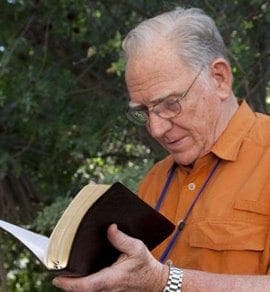 Recruited into senior management at the Ford Motor Company in Dearborn, Michigan, Chuck established the first international computer network in 1966. He left Ford to start his own company, a computer network firm that was subsequently acquired by Automatic Data Processing (listed on the New York Stock Exchange) to become its Network Services Division.
Recruited into senior management at the Ford Motor Company in Dearborn, Michigan, Chuck established the first international computer network in 1966. He left Ford to start his own company, a computer network firm that was subsequently acquired by Automatic Data Processing (listed on the New York Stock Exchange) to become its Network Services Division.
Returning to California, Chuck found himself consulting, organizing corporate development deals, serving on the board of directors at several firms, and specializing in the rescuing of financially troubled technology companies. He brought several companies out of Chapter 11 and into profitable operation. Chuck thrived on this type of work.
As Chuck notes, his day of reckoning came several years ago when — as the result of a merger — he found himself the chairman and a major shareholder of a small, publicly owned development company known as Phoenix Group International. The firm established an $8 billion joint venture with the Soviet Union to supply personal computers to their 143,000 schools. Due to several unforeseen circumstances, the venture failed. The Misslers lost everything, including their home, automobiles and insurance.
It was during this difficult time that Chuck turned to God and the Bible. As a child he developed an intense interest in the Bible; studying it became a favorite pastime. In the 1970s, while still in the corporate world, Chuck began leading weekly Bible studies at the 30,000-member Calvary Chapel Costa Mesa, in California. He and Nancy established Koinonia House in 1973.
